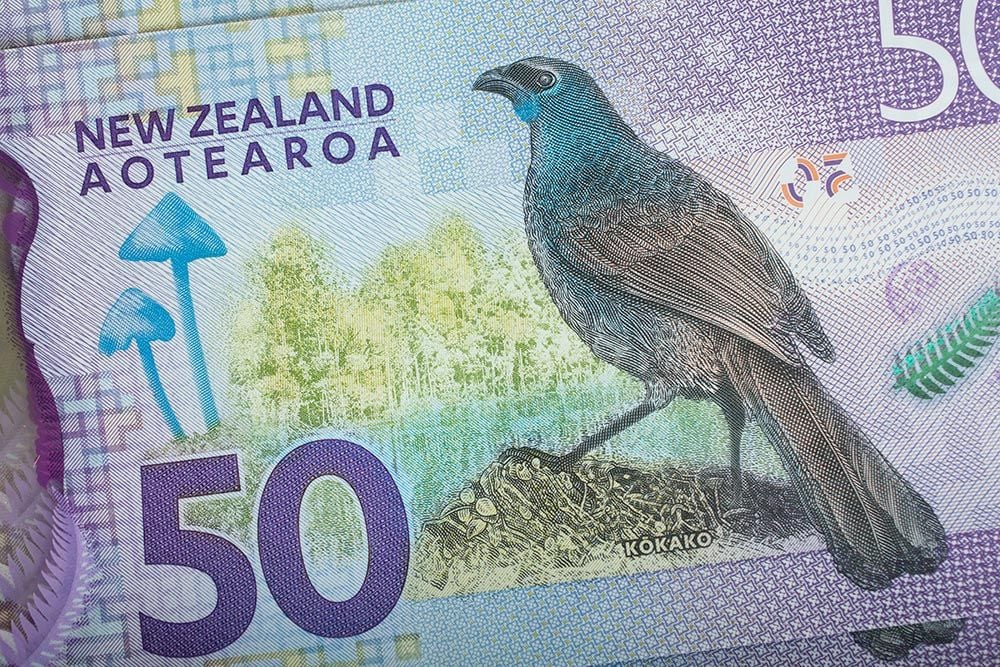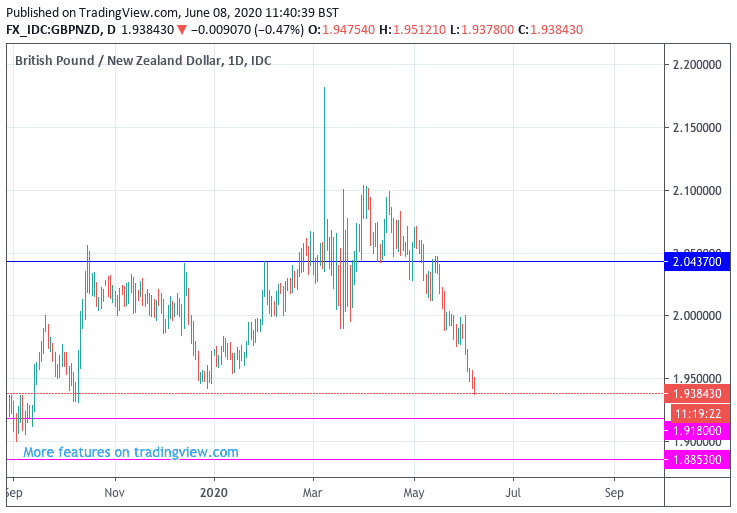Pound-New Zealand Dollar Exchange Rate Forecast: Could Go as Low as 1.88
- GBP/NZD downtrend remains entrenched
- Potential forecast target located at 1.88
- NZD aided by news NZ to enter level 1 this week

Image © Adobe Stock
Achieve up to 3-5% more currency for your money transfers. Beat your bank's rate by using a specialist FX provider: find out how.
The British Pound's recent period of deprecation against the New Zealand Dollar might be on course to extend over coming weeks, with the Kiwi currency likely to be underpinned by supportive technical market conditions and an economy that will likely bounce back as lockdown restrictions are fully lifted.
The Pound-to-New Zealand Dollar exchange rate has been in decline for three consecutive weeks, and of the past nine weeks the Pound has fallen in all but three suggesting that near- and medium-term momentum is lower.
The pair is presently located at 1.9397 at the start of the new week, with analysis from technical signal and intelligence providers Trading Central showing that the downside in GBP/NZD is to be preferred as long as the exchange rate remains below resistance located at 2.0437.
As long as the market remains below this pivot, the potential for declines down to the nearest substantial support levels located at 1.9180 and then 1.8853 is forecasted.
Backing the view that further declines are likely is the Relative Strength Index which is currently located below 50 and is therefore confirming negative momentum while the MACD indicator is similarly negative and below its signal line.
"The configuration is negative," says Trading Central. "The pair stands below its 20 and 50 MAs (respectively at 2.0105 and 2.0420)."
The New Zealand Dollar is likely to remain favoured in the current global market environment where equities and commodity prices are rallying. The ongoing improvement in commodity prices - built on an assumption that the world's economy is finding its feet again - naturally helps the so-called commodity currencies, of which the New Zealand Dollar is considered.
New Zealand is an exporter of lamb and dairy products as well as timber and fruit; any lift in the price of these commodities boosts the country's terms of trade which in turn ensures a steady and fundamental demand for Kiwi dollars.
The outlook for the world's economy took a firm step forward on Friday after U.S. jobs data surprised the market by showing a sizeable increase in the number of employment people in the world's largest economy. The U.S. surprise was swiftly followed by a similar outcome in Canada, which forced the markets to rethink their view on how long it would take the global economy to recovery.
"Nonfarm payrolls rose an astonishing 2500k, the highest on record. To say that “no one saw this coming” would be a gross understatement; no one even forecast a rise, let alone a record rise," says Marshall Gittler, Head of Investment Research at BDSwiss Group. "Many people are shouting 'fraud' and 'cooking the books,' which is entirely possible. However, I’d like to point out that Canada’s employment data for May, released at the same time, showed the same pattern. Employment rose by 290k instead of falling by 500k, as expected."
As long as this assumption is maintained, we would assume the background conditions for further New Zealand Dollar gains agains the likes of Sterling, Euro and U.S. Dollar are in place.
The domestic backdrop is also supportive of the New Zealand economy and currency, with almost all coronavirus restrictions in New Zealand due to be lifted tomorrow, Prime Minister Jacinda Ardern said on Monday.
New Zealand has now reported no active cases of covid-19, allowing schools and workplaces to open under the new "level 1" rules, with no limitations on gatherings or domestic travel.
Social distancing, however, is still encouraged and Ardern said New Zealand's international borders will remain shut to non-residents to prevent new outbreaks.
The move should allow the domestic economy to rally back towards pre-covid times, and in doing so outperform its peers that remain hobbled by covid-19 cases and restrictions that will ensure their economies continue to underperform their full potential.
This should provide a pro-New Zealand Dollar argument in a market that is increasingly focussed on the differing speeds that countries exit lockdown,
New Zealand currently has no active coronavirus cases, and no positive cases reported in the past 17 days.
There has been no one receiving treatment in hospital for Covid-19 for the past 12 days and it has been 40 days since the last case of community transmission.
"This freedom from restrictions relies though heavily on the ongoing role that our border controls will play in keeping the virus out ... The virus will be in our world for some time to come," Ardern said.





